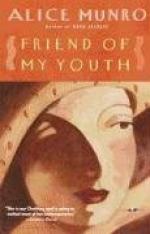|
This section contains 1,965 words (approx. 7 pages at 300 words per page) |

|
Use of Narrative Uncertainty in Alice Munro's "Friend of My Youth"
Summary: Explores narrative uncertainty in Alice Munro's "Friend of my Youth." Describes how the author creates stories out of plots that seem so realistic that they could, or did, actually happen, and as part of the "real life" experience, adds uncertainty into her stories.
Narration is a key element of any story - wherever there is a story there must be someone to tell its tale, but what happens when the narrator is uncertain of events they are describing? Alice Munro's "Friend of my Youth" is a collection of short stories that usually has a general topic of "real life." The author creates stories out of plots that seem so realistic that they could, or did, actually happen, and as part of "real life" experience, Munro adds uncertainty into her stories. "Meneseteung" and "Differently," represent excellent examples of narrative uncertainty. Narrative uncertainty is a literary device that Munro employs in her works. It generally follows a trend best described as in every story, at least once, the narrator is unsure of an entity, its surroundings, its feelings, et cetera. The narrator, being the person telling the story, would normally have the facts...
|
This section contains 1,965 words (approx. 7 pages at 300 words per page) |

|


